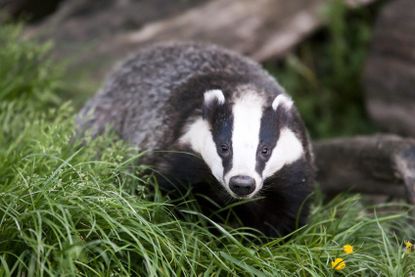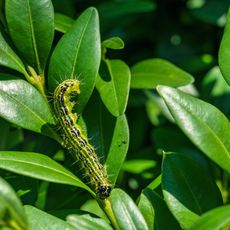Deterring Badgers: How To Get Rid Of Badgers In The Garden


Badger damage can be annoying and visually distressing but rarely causes permanent effects. Their behavior is habitual and seasonal and generally badgers in the garden are not a problem during winter and fall. If badger damage is bad enough you feel you need to take steps learn how to get rid of badgers and minimize their digging destruction.
Badger Damage in the Garden
Badgers have a wide range in North America and European nations. They are a protected species in the United Kingdom but laws are more flexible in the United States. Badgers in the garden tend to dig up lawns to find insects and, occasionally, flower beds to eat bulbs or vegetable beds when other food is scarce. Because these animals are creatures of habit, it can be very difficult to control them. Keeping badgers away may require special fencing, ceasing feeding other animals and natural insect control. Badgers build setts, which are complex burrows where they live and raise young. They rarely do this in close contact to humans but, sometimes, a badger family may take up residence in a home garden. The most common effects from badgers in the landscape are sections of dug up grass. The animals are simply looking for larvae, a favorite food, and scrape away the sod with their heavy claws. In healthy lawns, this damage is not permanently harmful and the sod will recover in time. Digging usually occurs in spring when larvae are present. Badgers are very determined animals and may damage fences and barriers in their forage for food. They also mark their territory by digging "latrines," trenches marked with urine and feces to discourage other badgers and animals.
How to Get Rid of Badgers
Badger control in gardens can be challenging. Many recommend deeply set metal fences that prevent the animal from digging under. Electric fencing is also another option but this can be costly and harm domestic pets and other wildlife. Nuisance badgers that invade your kitchen compost bin or garbage can are easily controlled by securing lids with bungee cords. If you feed birds or other animals, especially with nuts or fruit, suspend this activity to reduce attracting badgers. Deterring badgers from the vegetable garden or fruit orchard can be difficult. The animal is omnivorous and will eat not only insects and larvae but also many types of vegetation and fruit as well as small vertebrates. Traditional methods of deterring badgers included rags soaked in kerosene or other fuel, but these can contaminate soil and are now banned methods in many regions. Because this is a very determined animal with very set habits and tenacity, repelling them from your garden can be challenging. Removing insects by the use of insecticides or larvicides is not recommended, as these are not the only food the animal seeks and such use can actually kill beneficial insects. To prevent digging in lawns where they habitually feed, apply some wire mesh over the area in spring when digging activity is most acute. Non-toxic methods, such as noise deterrents and sonic devices, have limited control since the animals get used to the annoying sensations. Olbas oil and citronella can deter the animals to some extent but need to be applied frequently, as scent diminishes over time and in rain. Overall, badgers add an element of the wild to your landscape and can be viewed as educational and enjoyable animals to learn about and watch. Keeping badgers away with toxic poisons and electrified devices can harm your garden ecosystem in the long run and are usually a method of last resort. Since any damage is short term and seasonal, the animal will soon leave your garden alone and long term control is not necessary.
Gardening tips, videos, info and more delivered right to your inbox!
Sign up for the Gardening Know How newsletter today and receive a free download of our most popular eBook "How to Grow Delicious Tomatoes."

Bonnie Grant is a professional landscaper with a Certification in Urban Gardening. She has been gardening and writing for 15 years. A former professional chef, she has a passion for edible landscaping.
-
 Urban Composting Guide: How To Compost In The Middle Of The City
Urban Composting Guide: How To Compost In The Middle Of The CityUrban composting does not have to be daunting. You can compost in the city, and maybe even try some urban worm composting!
By Mary Ellen Ellis
-
 Shrub Diseases And Pests To Watch Out For
Shrub Diseases And Pests To Watch Out ForShrub diseases and pests can be challenging. Learn how to recognize and eradicate them before they can present a danger to your plants.
By Susan Albert